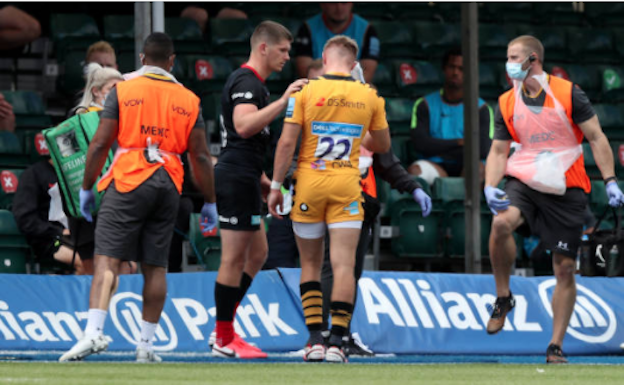Owen Farrell must face a lengthy ban for his horrendous high tackle against Wasps, but this time also has to be used to address his perennially problematic tackle technique, writes CRAIG LEWIS.
Farrell has become renowned for his tackle technique that has often been seen as dangerous and reckless. This is no secret in the rugby world.
Indeed, there have been more than enough examples of this in the past, but the hit on Charlie Atkinson on Saturday was as bad as it gets.
Owen Farrell was red-carded for this dangerous tackle. If he faces a ban, how long do you think it should be? pic.twitter.com/roDQvBDMK5
— SA Rugby magazine (@SARugbymag) September 5, 2020
Farrell has been described as traditionally a ‘rugby-league style tackler’, where his technique promotes his shoulder to act as a momentum stopper.
However, it’s a technique he has failed to master within the laws of rugby union, and particularly during an important recent movement from World Rugby to prioritise safety, especially because around 70% of injuries come from the tackler taking a shot to the head.
Of course, the most well-known Farrell tackle incident came in the 2018 Test between England and the Springboks.
Despite a brutal collision with Andre Esterhuizen, the officials opted against any form of sanction against Farrell, while denying the Boks an opportunity to line up what could have been a match-winning penalty.
World Rugby also refused to comment on the incident and, ultimately, it’s led to Farrell’s tackle technique going unpunished and unaddressed.
Therein lies the problem.
To put this in a different context: this is surely akin to a fast bowler in cricket being afforded leeway to continue bowling despite having a delivery in his repertoire that is outside the laws and has the potential to put a batsman in extreme danger.
Picture a pace bowler repeatedly reverting to an impact delivery with a slightly bent arm, but then seeing nothing done about it despite putting the batsman in harm’s way.
Yet, just as this sort of hypothetical scenario would have the bowler called out of action and sent to spend timing working on his technique before returning to play, there now has to be action taken to ensure Farrell corrects his tackle technique once and for all.
As highlighted by former England international Andy Goode on Saturday, this problem has been picked up by outside observers for some time, and it was ‘a case of when this happened not if’.
Shocking swinging arm from Owen Farrell and deserved a red card. Decent ban coming too, I talked about his tackle technique on @TheRugbyPod previously and it was a case of when this happened not if….. pic.twitter.com/kpnkqjETrp
— Andy Goode (@AndyGoode10) September 5, 2020
After the 2018 incident with Farrell and Esterhuizen, Springbok boss Rassie Erasmus not so subtly seemingly sought to highlight the need for action to be taken when he said that if it was deemed legal than others would have every right to replicate that technique.
Later a video emerged which showed Erasmus conducting a training drill with Esterhuizen where he appeared to be coaching this ‘technique’. Yet, the greatest irony was that the Bok boss ultimately realised this was not the best way to have handled the matter. It led to change a mindset that served the Springboks well in the lead-up to and at the World Cup.
‘Our first thing we had to get right was for referees to understand that we respected them,’ Erasmus revealed in a recently-released book, ‘Miracle Men’. ‘That was maybe a mistake we had made in earlier Test matches, like the one we lost against England with the Farrell tackle and my actions after that.
‘That was one of the lessons for me and the players … The moment you as a coach start respecting the referee and looking at how you can help him make the game work, the players do too. It’s about the referee feeling comfortable and understanding that you don’t look down on him.’
All that aside, it’s time for Farrell to finally take responsibility for correcting his technique, but it’s also up to his coaches and those governing the game to ensure that action is taken and the correct message is sent out when it comes to his disciplinary hearing.
As highlighted by SA Rugby magazine contributor and former Springbok Stefan Terblanche, who served as a member of the judicial committee at the 2019 World Cup, this latest suspension could be a lengthy one.
Yet, it’s what Farrell does during this expected time out of the game that remains just as important as the right action being taken to demonstrate that this sort of repeated and dangerous tackle technique has no place in the game.
Ticks all the boxes for longer though. Previous foul play incidents and history will come into play as well. https://t.co/NFJfrDXa4o
— Stefan Terblanche (@StefanT15) September 5, 2020





